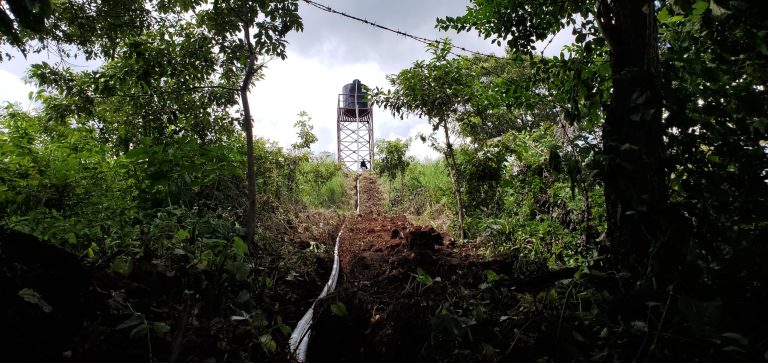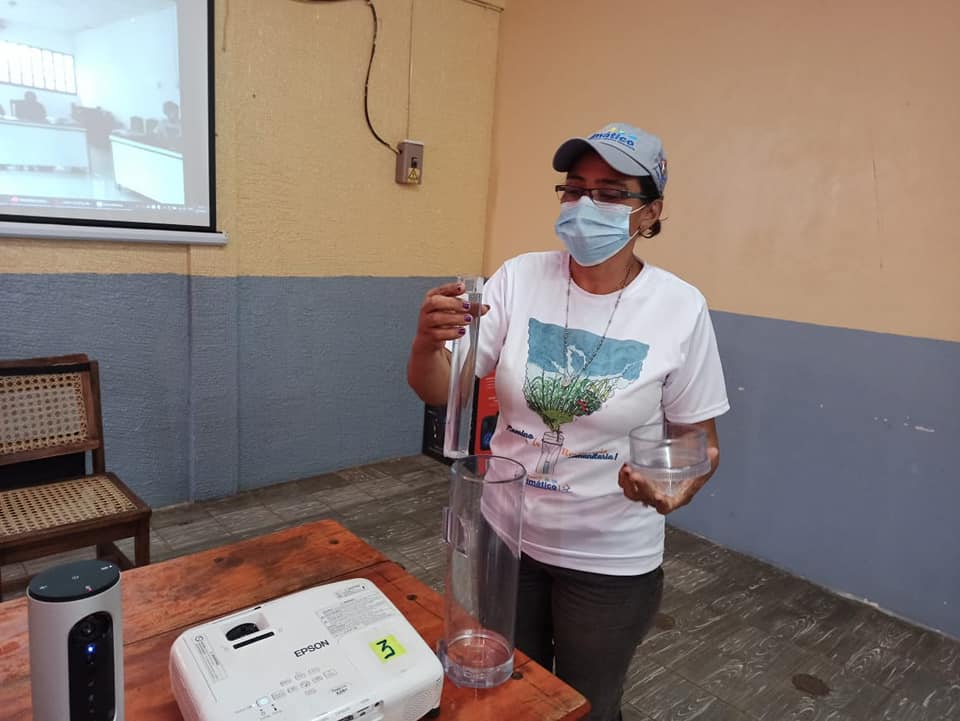4 de abril 2022

Children of Exile: The Births “Sowing Hope” in the Camp of Nicaraguan Farmers

PUBLICIDAD 1M
PUBLICIDAD 4D
PUBLICIDAD 5D
The organization denounced the deforestation and invasion in protected areas of the country, and also warned of the 2018 fire in the Indio Maíz reserve

The Humboldt Center has benefited several communities in the west of the country with drinking water projects. Photo: Courtesy
Maritza Chavarría traveled up to three kilometers a day in search of water, and the scarcity worsened as time passed. Her children were not going to school because there was no water to bathe or cook. When the Alexander Von Humboldt Center non-governmental organization arrived in 2018, the La Grecia community of Somotillo, Chinandega asked for access to safe water, and that finally became a reality in 2020.
Chavarría remembers those moments with nostalgia, but her voice quickly turns sad as she notes that the project technicians will never return because the Humboldt Center —as the NGO is known— was one of the 25 NGOs that the National Assembly stripped of legal status on March 17, accusing them of allegedly breaching laws regulating non-profit entities.
“The day they gave us the news, we got together and cried,” says Chavarría, adding that the forced closure of the NGO has had a “big” impact on the community. In addition to providing access to water, the Humboldt Center trained community members in orchard preparation, soil transformation, adaptation to climate change, risk management, and also integrated them into the climate-monitoring network.
This knowledge is invaluable for the community made up of some 75 families who live off of agriculture and reside in the country’s so-called dry corridor; one of the areas most vulnerable to the effects of climate change. In fact, the Humboldt Center chose the communities where it worked based on their risk level in the face of droughts and other climatic phenomena, with the aim of preparing the population to best take on these challenges.
In recent years, the Center has also worked in communities located in the buffer zone of the Bosawás Biosphere Reserve, the Indio Maíz Biological Reserve and the Delta del Estero Real Nature Reserve, teaching the communities how to sustainably manage natural resources.
María Eugenia Ordónez is a leader in the Puerto Morazán community of Chinandega. Her family and the 375 other families in the area live off of fishing. They do not have access to water, and were very hopeful because the Humboldt Center was working on a well drilling project, but with the cancellation of its legal status, those plans are now on hold.
“It affects us a lot, and basically left us without the wherewithal to continue the project,” says Ordóñez, who has to travel to the surrounding communities to obtain water, while waiting for a truck to appear every 20 or 30 days to provide the community with water. “We have the beginning, but not the end. I don’t know how we are going to finish this; we had hoped that the Humboldt Center would finish the potable water project. This affects us a lot, the children, the family, our community,” she says.
In 2020, the environmental organization that celebrated its 32nd anniversary on April 3, worked with 190 communities in the country, including 22 indigenous communities. The Center benefited 3,581 people from 13 communities in the municipalities of Somotillo, Villanueva, Chinandega, Condega and Puerto Morazán with the drilling of six wells and the repair of seven others, according to its 2020 annual report.
On March 17, the organization stated that, since 2020, the Ministry of Interior’s Office of Registration and Control of Associations had repeatedly refused to accept the Humboldt Center’s legal and financial documentation. Like the Humboldt Center, dozens of other organizations, foundations and associations have pointed out that the Ministry has imposed significant obstacles to organizations attempting to comply with the provisions of the Foreign Agents Regulation Law, approved in mid-October 2020 as part of a package of punitive laws designed to silence voices critical of the government, including many civil society organizations promoting social, political, economic, human rights, democracy, education, environmental and health development in Nicaragua.
Since 2018, the Ortega regime has stripped 143 organizations, foundations, and associations of their legal status. This started in 2018 with the government punishing nine organizations, accusing them of “managing, receiving, channeling and facilitating funds to alter public order and carry out destabilizing acts in the country”, in an attempt to delegitimize the civic protest and strengthen their claims of a supposed ‘coup’.
Since then, the government has confiscated the assets of more than six organizations, including universities, who had their legal status cancelled.
The Humboldt Center has always played a watchdog role on issues related to environmental management in the country, repeatedly questioning governmental decisions that went against the sustainable management of natural resources.
In 2014, together with other environmental organizations, they formed the Cocibolca Group and pointed out that the Interoceanic Dry Canal, which the Ortega regime intended to build with the Chinese businessman Wang Jing, was “environmentally unfeasible,” according to the findings of their Environmental and Social Impact Study.
They also warned about the advance of deforestation, and the invasion of settlers in protected areas. In 2018 they echoed the need for urgent attention to the fire in the Indio Maíz Biological Reserve, considered one of the triggers for the civic uprising that year and until last week, they were a resource on climate surveillance for the media.

The Humboldt Center has built a network of 1,300 community climate observers, which has made it possible to create climate forecasts by zone throughout the country. Photo: Courtesy
Chavarría was in charge of monitoring the weather in La Grecia, part of some 1,300 community weather observers the Humboldt Center had trained to monitor humidity, precipitation, and wind conditions in the country. The network has grown, mainly in the west of the country, with the objective of having farmers take climate data into account to make better decisions, along with implementing agro-ecological practices. “I am going to continue doing this work as long as God allows us,” says Chavarría. “We are not going to let ourselves be defeated, we are going to move forward with the knowledge that they gave us.”
This article was originally published in Spanish in Confidencial and translated by Havana Times
Archivado como:
PUBLICIDAD 3M
Confidencial es un diario digital nicaragüense, de formato multimedia, fundado por Carlos F. Chamorro en junio de 1996. Inició como un semanario impreso y hoy es un medio de referencia regional con información, análisis, entrevistas, perfiles, reportajes e investigaciones sobre Nicaragua, informando desde el exilio por la persecución política de la dictadura de Daniel Ortega y Rosario Murillo.
PUBLICIDAD 3D